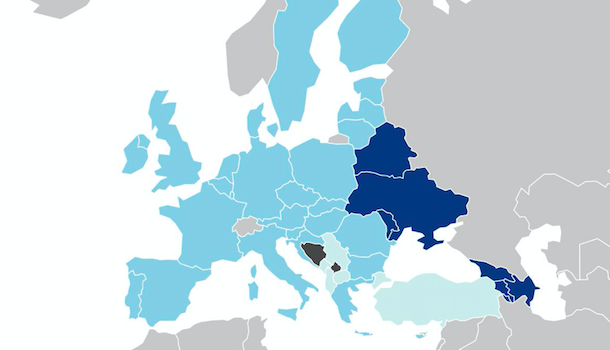Format: conference, open to the media
Participants: 100 participants – diplomats, academics, and experts
Languages: English and Russian
Organisers: Minsk Dialogue Track-II Initiative and Estonian Presidency in the Council of the EU, supported by the Konrad Adenauer Foundation
Aims:
- To analyse results achieved by the Eastern Partnership.
- To assess the geopolitical situation in the region which provides context for the development of the Eastern Partnership; to identify opportunities and limitations the initiative has within this context.
- To prepare recommendations for the upcoming Eastern Partnership summit in Brussels.
Agenda
|
9.00-9.30 |
Registration |
|
9.30-10.30 |
Opening ceremony, welcome remarks Oleg Kravchenko Deputy Minister of Foreign Affairs of the Republic of Belarus Merike Kokaev Ambassador Extraordinary and Plenipotentiary of the Estonian Republic in the Republic of Belarus Wolfgang Sender Country Director Belarus, Konrad Adenauer Foundation, Germany Yauheni Preiherman Head, Minsk Dialogue Track-II Initiative, Belarus |
|
10.30-12.30 |
Session 1. The Eastern Partnership after Eight Years: Achievements and Failures Eight years have passed since the launch of the Eastern Partnership. These years have witnessed numerous important events in the life of the whole region, EU and individual states. Has the Eastern Partnership become a productive forum for the development of relations between the EU and partner countries? What have been its main accomplishments and failures? What cooperation formats have proved to be most effective? Vadim Pistrinciuc Member of Parliament; Founder, Institute for Strategic Initiatives of Moldova, Moldova David Cadier Associate, LSE IDEAS, London School of Economics, France-UK Andrian Prokip Energy Expert, Institute for Social and Economic Research; Senior Associate, Kennan Institute Kyiv Office, Ukraine Mikayel Zolyan Analyst, Regional Studies Centre, Yerevan, Armenia Aliaksandr Filipau Director of the Advanced Training and Further Education Institute – Dean of the Faculty of Extended Education, Belarusian State University of Culture and Arts; Expert, Discussion and Analytical Society Liberal Club, Belarus Moderator: Wolfgang Sender Country Director Belarus, Konrad Adenauer Foundation, Germany |
|
12.30-13.30 |
Lunch |
|
13.30-15.30 |
Session 2. The Impact of the Region’s Changing Geopolitics on the Eastern Partnership The relations between Russia and the West continue to escalate and frame the situation in Eastern Europe and the South Caucasus. What ramifications does it have for the Eastern Partnership? How do internal processes in the countries of the region impact their priorities in relations with the EU and Russia? What are the implications of the overhaul of the European Neighbourhood Policy for the Eastern Partnership? Can Belarus’s peacemaking initiatives have a place in the Eastern Partnership? Maxim Suchkov Editor, Al-Monitor’s Russia coverage; Non-resident expert, Russian International Affairs Council and Valdai Discussion Club, Russia Jaan Reinhold Ambassador-at-Large for the Eastern Partnership, Ministry of Foreign Affairs; Director, Estonian Centre for Eastern Partnership, Estonia Diana Potjomkina Research Fellow, Latvian Institute of International Affairs, Latvia Andrei Kazakevich Director, Institute of Political Studies “Political Sphere”, Belarus Samuel Charap Senior Political Scientist, RAND Corporation, USA Yauheni Preiherman Head, Minsk Dialogue Track-II Initiative, Belarus Moderator Dzianis Melyantsou Programme Coordinator, Minsk Dialogue Track-II Initiative, Belarus |
|
15.30-16.00 |
Coffee break |
|
16.00-18.00 |
Session 3. Can New Impetus Be Given to the Eastern Partnership? In November, Brussels will host the next Eastern Partnership summit. The heads of states will need to answer a number of highly complicated questions. Their responses will be crucial for the future of the initiative and stability of the entire region. What lessons should be learnt from the Eastern Partnership’s past? Do the objectives of the initiative need revision in light of the changing geopolitical situation? What short- and medium-term priorities can become the partnership’s new drivers? Tinatin Goletiani Key Expert, EU-Funded Project in Georgia – “Legislative Impact Assessment, Drafting and Representation”, Georgia Uladzislau Vialichka Director General, EuroBelarus International Consortsium, Belarus Bartosz Rydliński Project Manager, Aleksander Kwasniewski’s Foundation “Amicus Europae”, Poland Dzianis Melyantsou Programme Coordinator, Minsk Dialogue Track-II Initiative, Belarus Moderator Yauheni Preiherman Head, Minsk Dialogue Track-II Initiative, Belarus |
|
18.00-18.15
|
Concluding Remarks |


